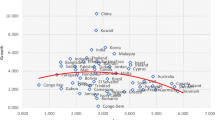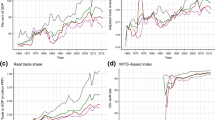Summary
The main purpose of the present approach is to empirically demonstrate that the hypothesis "the corporatist economies have outperformed others in the 1970s" should be qualified. To do so, it is first necessary to account for the impact of technological catch-up processes which after World War II in Western industrial countries have been of central importance. Since the then existing technological gaps have narrowed in the course of time, catching-up potentials also have decreased, and thus economic growth.
The analysis of corporatism led to the hypothesis that economies which are competitively organized have done as well as the corporatist economies. The true losers being those countries which are neither characterized by a high degree of national consensus nor by a highly competitive structure. The empirical results support this hypothesis for the 1970s when large supply shocks and monetary disturbances hit the world economy.
Zusammenfassung
Korporativismus, technologische Lücken und Wachstum in OECD-Ländern. - In dieser Untersuchung wird empirisch gezeigt, daß das Wirtschaftswachstum in den Industrieländern in den sechziger und siebziger Jahren eine Funktion von technologischen und institutionellen Faktoren war. Unter Berücksichtigung technologischer Aufholprozesse führt die Analyse des Korporativismus zu der These, daß die wettbewerblich organisierten Länder zumindest ebenso schnell gewachsen sein dürften wie die korporativistischen Volkswirtschaften, während die eigentlichen Verlierer jene Länder sind, die weder durch ein hohes Maß an nationaler übereinstimmung noch durch eine stark wettbewerblich ausgerichtete Struktur gekennzeichnet sind. Die empirischen Ergebnisse stützen diese Thesen für die siebziger Jahre, in denen die Weltwirtschaft starken angebotsbedingten Veränderungen und monetären Störungen ausgesetzt war.
Résumé
Corporativisme, «technological gap» et croissance dans les pays OCDE. - Dans cet article, l’auteur démontre empiriquement que la croissance en pays industriels dans les années soixante et soixante-dix était une fonction des facteurs technologiques et institutionnels. En considérant les processus technologiques «catching-up», l’analyse menait à l’hypothèse que des pays organisés compétitivement auraient eu au moins la mÊme performance que les économies corporativistes. Les vrais perdants seraient les pays qui n’étaient pas caractérisés ni par un haut degré de consensus national ni par des structures strictement compétitives. Les résultats empiriques supportent ces hypothèses pour les années soixante-dix quand des grands chocs et des perturbances monétaires touchaient l’économie mondiale.
Resumen
Corporativismo, brecha tecnológica y crecimiento en los países de la OECD. - En este trabajo se demuestra empíricamente que el crecimiento de los países industrializados en los años sesenta y setenta se debe a factures tecnológicos e institucionales. Tomando en cuenta el impacto del proceso de alcanzar la frontera tecnológica se deriva la tesis que países en los cuales rige la competencia deberfan haberse desarrollado al menos a la par de los países corporativistas. Los países rezagados serfan aquellos que no se caracterizan ni por un alto grado de consenso nacional ni por estructuras competitivas. Los resultados apoyan la tesis para los años setenta, cuando la economía mundial sufrió importantes shocks de oferta y problemas monetarios.
Similar content being viewed by others
References
Abramovitz, Moses, “Catching Up, Forging Ahead, and Falling Behind”.The Journal of Economic History, Vol. 46, 1986, pp. 386–406.
Baumol, William J., “Productivity Growth, Convergence, and Welfare: What the Long-Run Data Show”.The American Economic Review, Vol. 76, 1986, pp. 1072–1085.
Bruno, Michael, Jeffrey D. Sachs,Economics of Worldwide Stagflation. Oxford 1985.
Cameron, David R.,Social Democracy, Corporatism, and Labor Quiescense: The Representation of Economic Interest in Advanced Capitalist Societies. Paper presented at the Conference on Governability and Legitimacy in Western European Democracies, Stanford University, 1982.
Choi, Kwan,Theories of Comparative Economic Growth. Iowa 1983.
Cornwall, John,Modern Capitalism. Its Growth and Transformation. London 1977.
Crouch, Colin, “The Conditions for Trade Unions Wage Restraint”. In: Leon Lindberg, Charles Maier (Eds.),The Politics of Inflation and Economic Stagnation. Theoretical Approaches and International Case Studies. Washington, D.C., 1985, pp. 105–139.
Heitger, Bernhard, “Bestimmungsfaktoren internationaler Wachstumsdifferenzen”.Die Weltwirtschaft, 1985, Heft 1, pp. 49–69.
Kormendi, Roger C., Philip G. Meguire, “Macroeconomic Determinants of Growth — Cross-Country Evidence”.Journal of Monetary Economics, Vol. 16, 1985, pp. 141–163.
Olson, Mancur, “Stagflation and the Political Economy of the Decline in Productivity”.The American Economic Review, Vol. 72, 1982, pp. 143–148.
Parvin, Manoucher, “Technological Adaptation, Optimum Level of Economic Backwardness and the Rate of Per Capita Income Growth: An Econometric Approach”.The American Economist, Vol. 19, 1975, pp. 23–31.
Summers, Robert, Alan Heston, “Improved International Comparison of Real Product and Its Composition: 1950–1980”.The Review of Income and Wealth, Ser. 30, 1984, pp. 207–262.
Tarantelli, Ezio, “The Regulation of Inflation in Western Countries and the Degree of Neocorporatism”.Economia, Vol. 7, 1983, pp. 199–238.
About this article
Cite this article
Heitger, B. Corporatism, technological gaps and growth in oecd countries. Weltwirtschaftliches Archiv 123, 463–473 (1987). https://doi.org/10.1007/BF02707755
Published:
Issue Date:
DOI: https://doi.org/10.1007/BF02707755




